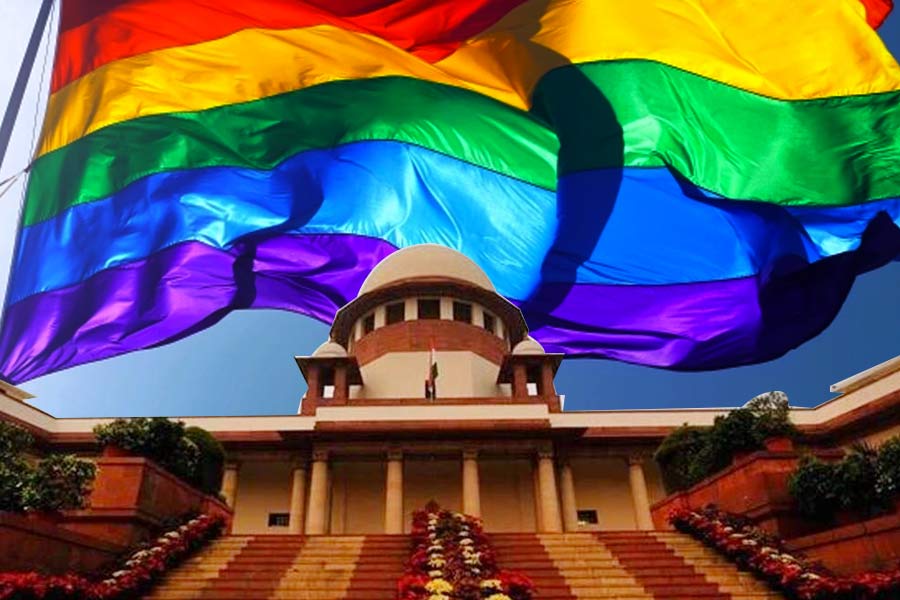Pronouncing its verdict on a batch of 20 petitions seeking the right to marry for LGBTQIA+ couples in India, the Supreme Court said on Tuesday:
- Same-sex marriage: Justice Bhat disagrees with CJI on right of queer couples to adopt, says he has voiced certain concerns
- Queer persons have right to choose partners, State cannot be obligated to recognise rights flowing from such union: Justice Bhat
- Same-sex marriage: Justice S Ravindra Bhat says he agrees and differs with views of CJI Chandrachud on certain points
- CJI directs police to conduct preliminary enquiry before registering FIR against queer couple over their relationship
- Legal recognition of non-heterosexual unions is step towards marriage equality, says Justice SK Kaul
- Non-heterosexual and heterosexual unions must be seen as both sides of same coin: Justice SK Kaul
- Same-sex marriage: Justice S K Kaul agrees with CJI on grant of certain rights to queer couples
- Court records SG Tushar Mehta's statement that Centre will form panel to decide rights, entitlements of persons in queer unions: CJI
- Same-sex marriage: Queer is a natural phenomenon known for ages, it is neither urban nor elitist, says CJI Chandrachud
- Same-sex marriage: Centre, States and Union Territories to ensure queer community is not discriminated against, CJI Chandrachud
- Right to enter into union includes right to choose partner, its recognition; failure to recognise such association discriminatory: CJI
- CJI : Differentia between married couples and unmarried couples has no reasonable nexus with the objective of CARA - the best interests of the child.
- CJI : It cannot be assumed that unmarried couples are not serious about their relationship.
- CJI DY Chandrachud : There is no material on record to prove that only a married heterosexual couple can provide stability to a child.
- CJI DY Chandrachud : CARA Regulation 5(3) indirectly discriminates against atypical unions. A queer person can adopt only in an individual capacity. This has the effect of reinforcing the discrimination against queer community.
- All persons, including those queer, have right to judge moral quality of their lives: CJI Chandrachud on same-sex marriage
- Whether there is need for change in regime of Special Marriage Act is for Parliament to decide: CJI Chandrachud on same-sex marriage
- Same-sex marriage: It would be incorrect to state that marriage is a static and unchanging institution, says CJI Chandrachud
- To imagine queer as existing only in urban spaces would be like erasing them, queerness can be regardless of one's caste or class: CJI
- CJI Chandrachud says homosexuality or queerness is not urban concept or restricted to upper class of society
- This court can't make law. It can only interpret it and give effect to it, says CJI Chandrachud
- Same sex marriage: CJI D Y Chandrachud says there are four separate judgements in the matter
- SC commences pronouncement of verdict on 21 petitions seeking legal validation for same-sex marriage
- Five-judge SC bench assembles to pronounce verdict on pleas seeking legal validation for same-sex marriage
A five-judge constitution bench headed by Chief Justice D Y Chandrachud had on May 11 reserved its verdict on the pleas seeking legal validation for same-sex marriage after a marathon hearing of 10 days.
The other members of the bench are Justices Sanjay Kishan Kaul, S Ravindra Bhat, Hima Kohli and P S Narasimha.
During the arguments, the Centre had told the apex court that any constitutional declaration made by it on the petitions seeking legal validation for same-sex marriage may not be a "correct course of action" as the court will not be able to foresee, envisage, comprehend and deal with its fallout.
'Not looking into personal laws'
The bench had made it clear during the arguments that it will not go into personal laws governing marriages while deciding the pleas seeking judicial validation for same-sex marriages and said the very notion of a man and a woman, as referred to in the Special Marriage Act, is not "an absolute based on genitals".
The Centre had also told the court it had received responses from seven states on the issue of same-sex marriage and the governments of Rajasthan, Andhra Pradesh and Assam had opposed the petitioners' contention seeking legal endorsement for such wedlock.
'Can't anticipate Parliament's response'
The apex court had commenced hearing arguments in the matter on April 18.
While hearing the matter on May 11, the bench had observed it cannot give a declaration on same-sex unions on the anticipation as to how Parliament is likely to respond to it.
The bench made the observation after one of the advocates appearing for the petitioners referred to judicial verdicts, including in the instant triple talaq case, and said once the top court gave a declaration to pass a law penalising the practice, it was a matter for "fairly easy legislative consensus".
The bench had also made it clear during the arguments that it will not go into personal laws governing marriages while deciding the pleas seeking judicial validation for same-sex marriages.
Use of plenary power
Some of the petitioners had urged the apex court to use its plenary power, "prestige and moral authority" to push the society to acknowledge such a union which would ensure LGBTQIA++ lead a "dignified" life like heterosexuals.
LGBTQIA++ stands for lesbian, gay, bisexual, transgender, queer, questioning, intersex, pansexual, two-spirit, asexual and ally persons.
On May 3, the Centre had told the court it will constitute a committee headed by the cabinet secretary to examine the administrative steps that could be taken for addressing "genuine humane concerns" of same-sex couples without going into the issue of legalising their marriage.
The Centre's submission was pursuant to the apex court asking it on April 27 whether social welfare benefits like opening joint bank accounts, nominating life partner in provident funds, gratuity and pension schemes can be extended to same-sex couples without going into the issue of legal sanction to their marriage.










